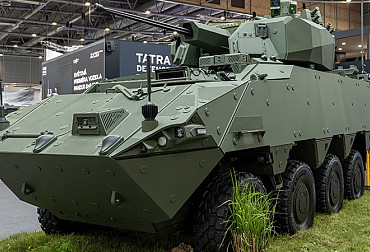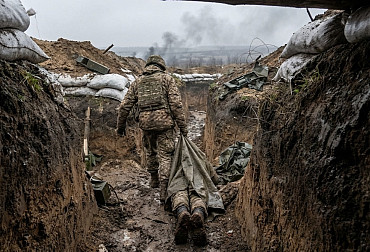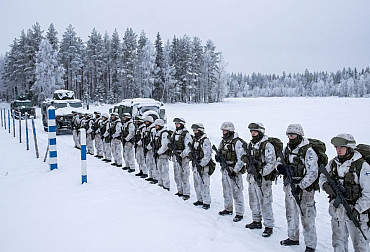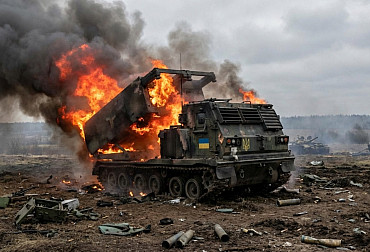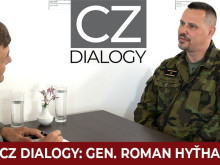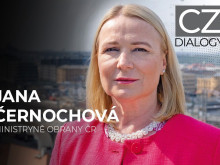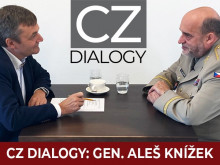Gen. Aleš Opata: Putin made Ukraine into something he never wanted
The war in Ukraine provoked by the Russian regime has been going on for more than a year. Every day not only tests the resolve of the Ukrainian army and civilian population defending their homeland, but also reflects the unity of the European and Alliance countries that support this defence. Army General Aleš Opata was the Chief of the General Staff of the Czech Army on 24 February 2022, when the Russian war against Ukraine began, and therefore experienced the start and development of the entire war up close, both in terms of Alliance cooperation and the impact of these circumstances on our army. General Opata has had a lot of experience not only from missions in the former Yugoslavia but also in Afghanistan. He has attended prestigious universities in the US and the UK. For the above reasons, we invited Gen. Aleš Opata, with whom we also talked about his recently published book of memoirs "Alone You Are Nothing" and discussed many other topics.
Video: Interview with former Chief of the General Staff of the Czech Armed Forces Army General Aleš Opata / CZ DEFENCE
According to General Opata, we need to see the beginning of Russia's aggressive behaviour around 2008. "Russia has gone from being, shall we say, assertive in demanding its interests to being aggressive," says the former Chief of the General Staff. Georgia was invaded during this period, and it peaked with the annexation of Crimea in 2014. "After that year, a whole series of things started to change within NATO. A lot of attention was paid to the eastern flank, force models changed and a whole range of other things," the general recalls. As for the war in Ukraine, it was certainly not a matter of the last few days or months. "We had already dealt with it very intensively from September to October 2021 in the NATO Military Committee, which is a committee of the chiefs of staff of all the armies of the Alliance. Those indications from the Americans and from the British were very crucial for me. More or less the high point of this actually happening was at the beginning of January, when there was an extraordinary meeting of the Chiefs of General Staff, the only point of which was Ukraine," says General Opata, adding, "The other thing to say is that we were in quite close contact with Valery Zaluzhny (Commander-in-Chief of the Armed Forces of Ukraine). Firstly, in the framework of the fact that he participated in some NATO Military Committee meetings, but at the same time he regularly attended V4 meetings. We have seen how Ukraine operates and how it is prepared for the conflict that may happen. And for me, what was crucial when Valery and I talked about this was that he always said, 'We're not going to give the Russians anything for free'." According to Opata, the current war in Ukraine cannot be compared to previous conflicts in the former Yugoslavia, which the general went through during his participation in four missions (UNPROFOR, IFOR, SFOR and KFOR). "The conflict in Ukraine is brutal. It is a typical conventional war with all the trimmings. It is not only a fight between armies, but it is mainly an attack on civilian infrastructure and on the Ukrainian population," Opata assesses the situation.
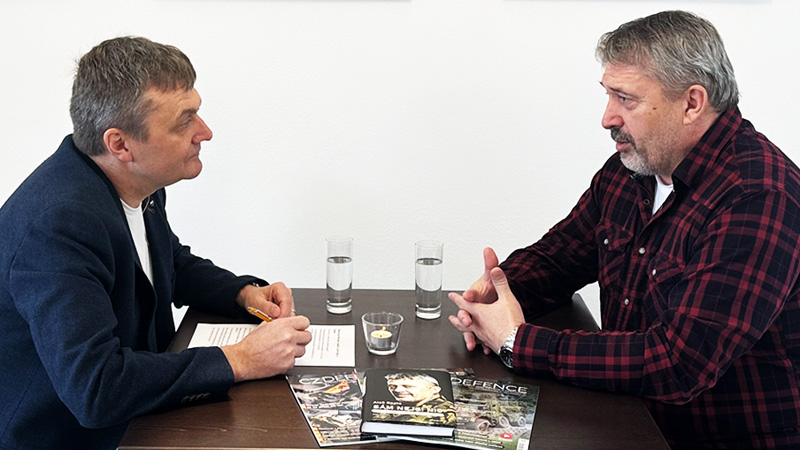 Picture: In this episode of our discussion show CZ DIALOGY, we talked with former Chief of the General Staff of the Czech Armed Forces Army General Aleš Opata | Michal Pivoňka / CZ DEFENCE
Picture: In this episode of our discussion show CZ DIALOGY, we talked with former Chief of the General Staff of the Czech Armed Forces Army General Aleš Opata | Michal Pivoňka / CZ DEFENCE
Preparation was important for our Army and for the armies of other alliance countries. Tactically, operationally or strategically, variants of conducting combat activities are prepared when planning possible conflicts. "One of those variants is always the worst that can occur, the next is the least likely and then the most likely. The scenarios were modelled in that preparation, they dealt with what might happen, always taking into account the worst-case scenario," the general recalls. But even for him the implementation of the worst-case scenario was a surprise: "I did not count on the fact that the worst-case scenario would be applied at the beginning of the invasion of Ukraine. I counted on the most likely scenario, namely that the conflict would be directed to the Donetsk region and to the east and south of Ukraine. I certainly did not count on Kiev being the strategic target. On the other hand, it has to be said that the Ukrainian army showed its great capabilities at the beginning of the conflict, the enormous motivation not only of the army but also of the nation. And they were able, by conducting a very effective manoeuvre defence, to stop the advance of Russian troops on Kiev and to defend Kiev, which I think was one of the key things of that conflict in Ukraine," says General Opata. An important moment for Ukraine is the unification of the army and the nation as a whole in defending its territory. General Opata agrees: 'I think that's one of Putin's nightmares because he's created something out of Ukraine that he never wanted. And today it is clearly a united state fighting Russia as a whole. On the other hand, he is quite clear about what he wants to achieve, and the support of the civilian population and the support of the Western countries is just enormous. And the way Ukraine is waging the war, the way it wants to liberate its territory, to me is famous."
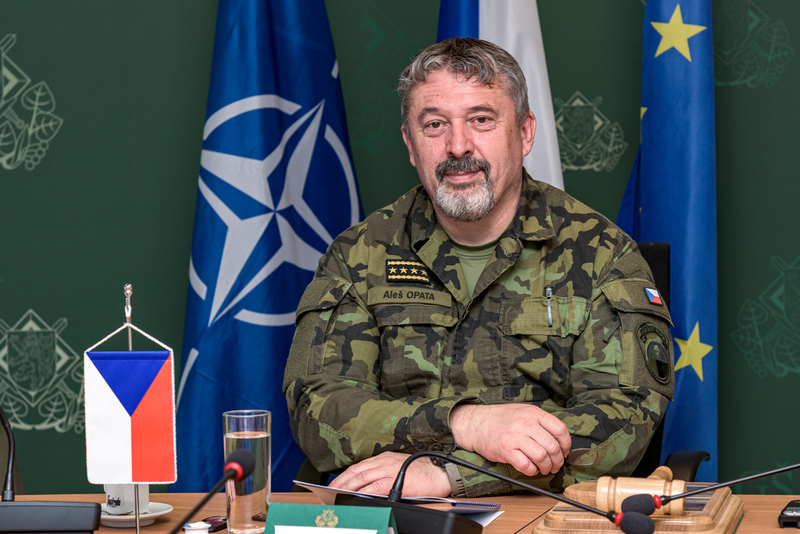 Picture: In this episode of our discussion show CZ DIALOGY, we talked with former Chief of the General Staff of the Czech Armed Forces Army General Aleš Opata | Michal Pivoňka / CZ DEFENCE
Picture: In this episode of our discussion show CZ DIALOGY, we talked with former Chief of the General Staff of the Czech Armed Forces Army General Aleš Opata | Michal Pivoňka / CZ DEFENCE
The war in Ukraine has been going on for a year now, and so considerations and questions are beginning to emerge about what will happen after the war is over, what is the optimal solution. Is it, for example, the achievement of Ukraine's original territorial integrity? According to General Opata, the conflict in military scenarios has several phases, and the last one is a return to the original state. "It sounds simple enough, but it is a complex and complicated problem that must be addressed now. Once the war is over, it won't just be about rebuilding infrastructure, which will be complex. The Russians smashed what they could smash. They have also hit the civilian infrastructure, the energy structure, in a significant way. Although the Ukrainians have learned to work with that energy, they have learned to fight it. It's going to be a huge penumbra to rebuild a country that is largely – especially down there in the south and east – destroyed. The second thing is that the losses are huge on both sides. And it's not just about dead and wounded soldiers. It's also about soldiers who will have in large numbers something called post-traumatic syndrome, which may not show up right away, it may show up over time. The next challenge is going to be taking care of war veterans. So the post-war reconstruction of Ukraine will be a complex problem and without significant help from the West and the EU, Ukraine will find it difficult to cope and we need to prepare for that," General Opata reflects.
As already mentioned in the introduction, the system of preparation and response of NATO countries at that time was changed by the annexation of Crimea in 2014. A whole new set of strategic documents, military strategy, was created. At that time, two new domains were created and integrated into the battlefield, and that is the cyber domain and the space domain. So it's not that we waited for the war in Ukraine to start, NATO's preparation for that situation and for the defense of the eastern flank started earlier. But of course it was not just the defense of the eastern flank, it was the defense of the entire NATO area of responsibility, because it's still not just about Russia, it's about terrorism, it's about a whole range of other threats that are on the table," General Opata points out.
Regarding the changes in the concept and training of our military, Opata says these are uniform throughout the Alliance and in all domains in which combat activities are conducted, i.e. on land, at sea, in the air, in the cyber domain and later in the space domain. "Today it's called Multi-Domain Operations (MDO) so that you are able to operate in the entire environment, which is three-dimensional," the general elaborates.
As part of the conversation, we also revisited the last Commanders' Assembly with General Opata as Chief of the General Staff of the Army. "It is fair to say that I took office in 2018, the budget of the army was increasing in the order of several billion crowns every year, which in a way gave stability to the planning processes and we were able to define the Concept of the Construction of the Army of the Czech Republic in the medium term. The main guidelines of the concept have not changed and are clearly linked to what is expected of us within NATO and what we need. Yes, I have criticised the dynamics of this process many times. Today, I see that it is beginning to accelerate and I see that the stability of resources in the medium term is predictable, which is certainly positive," the general says with some distance.
If you are interested in our full interview with Army General Aleš Opata, watch the video at the beginning of this article.











